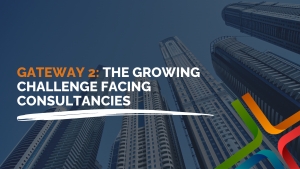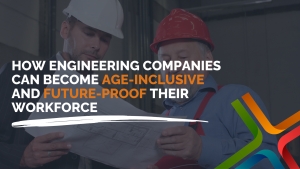In the ever-evolving landscape of building safety regulations in the UK, few changes have sent ripples through the civils and structures sectors quite like the introduction of Gateway 2 under the Building Safety Act 2022. While the Act itself is a welcome step forward for safety and accountability, the Gateway 2 process is rapidly becoming a major hurdle for design consultancies and, by extension, our clients.
What is Gateway 2?
Gateway 2 represents a critical checkpoint in the construction project lifecycle. It demands that all major residential developments demonstrate robust compliance with new building safety standards before physical construction can begin. The intention is clear: to ensure that designs are fully coordinated, risk-assessed, and compliant with regulations before shovels hit the ground.
However, the reality for consultancies has been far more complicated.
The Issues Gateway 2 is Creating for Consultancies
The Grenfell tragedy justifiably prompted calls for the development of safer, higher-quality buildings. However, the new regulatory framework for high-rise construction appears to have been created with little practical understanding of how the construction industry actually operates. This disconnect is perhaps unsurprising, given that the regulations were largely drafted by civil servants engaging primarily with trade bodies rather than consulting directly with experienced construction professionals.
This raises an important question: what are the implications of the unapproved Gateway 2 applications?
1. Increased Administrative Burden
Design consultancies must now produce far more detailed designs, safety case reports, and coordinated documentation much earlier in the project timeline. This front-loading of work demands greater time, effort, and collaboration, often without a corresponding increase in fees.
2. Project Delays
Without Gateway 2 approval, construction cannot commence. Delays in obtaining approval – often due to ambiguous guidance or evolving requirements – are causing significant hold-ups across the sector. For consultancies, these delays are frustrating and costly, affecting project timelines and client relationships.
3. Cashflow Challenges
Project delays are increasingly leading to deferred payments, creating significant cashflow challenges for many consultancies, particularly small and medium-sized firms. A major contributing factor is the structure of consultancy fee arrangements, where a substantial portion of the final payment is tied to a project’s formal transition into the construction phase. With Gateway 2 approvals now stalled, access to these critical final payments is effectively blocked, exacerbating financial pressures.
4. Reputational Risk
When projects stall, clients often look to their consultants for answers. Even when delays are regulatory in nature, consultancies risk reputational damage. Maintaining client trust through these challenges requires clear, proactive communication – and even then, frustrations are inevitable.
How Clients are Being Impacted
Our clients – developers, contractors, and investors – are feeling the knock-on effects profoundly:
- Construction Delays mean delayed returns on investment and extended financing costs.
- Uncertainty in Project Planning disrupts supply chains and labour scheduling.
- Budget Overruns are becoming more common as projects stretch beyond initial timelines.
Ultimately, Gateway 2’s challenges for design consultancies cascade down the entire project chain, causing real commercial pain for all parties involved.
Navigating the New Reality
Forward-thinking consultancies are already adapting by:
- Expertise in Gateway 2 Submissions Consultancies with extensive experience in delivering civil and structural engineering services during RIBA Stages 4 and 5 have established themselves as leaders in developing comprehensive design documentation for Gateway 2 submissions. Their depth of knowledge is such that they have also been able to guide and advise other designers on the necessary requirements and best practices for preparing these submissions.
- Investing in bid preparation and compliance expertise, ensuring submissions meet stringent Gateway 2 requirements.
- Strengthening stakeholder engagement, working more collaboratively with clients, contractors, and regulators.
- Leveraging specialist support, such as legal advisors and safety case consultants, to navigate the regulatory maze.
What the Government Needs to Do
While the industry is working hard to adapt, it is clear that greater support from the government is essential. To ease the transition and ensure that Gateway 2 achieves its safety objectives without stifling development, the government must:
- Provide clearer and more consistent guidance to eliminate ambiguity in the approval process.
- Streamline and expedite the review and approval process to avoid unnecessary project delays.
- Offer financial support or incentives to SMEs struggling with the additional compliance burdens.
- Facilitate open forums and workshops where industry professionals can engage directly with regulators, offering feedback and receiving updates.
- Invest in training and resources for regulators themselves, ensuring they can assess submissions efficiently and consistently.
Recent developments have highlighted how critical these improvements are. According to a report by the Construction Enquirer, the Building Safety Regulator has missed its self-imposed deadline to clear the Gateway 2 backlog. Hundreds of projects are stuck in limbo, awaiting approval, which is compounding delays and deepening cashflow issues across the sector. The backlog demonstrates that the current system is under-resourced and not equipped to handle the volume of applications, making government intervention even more urgent.
By taking these steps, the government can help balance the urgent need for safer buildings with the practical realities of the construction and design sectors.
Let's Tackle Gateway 2 Together
At Alexander Associates, we understand the pressures our partners and clients are under. As specialists in the building, design, and structures sector, we’re committed to supporting consultancies and project teams through this period of adjustment. Whether it's providing access to compliance-savvy talent, facilitating expert-led workshops, or simply helping you scale your teams more flexibly, we're here to help.
In a significant step forward, we've proudly signed the Age-Friendly Employer Pledge with the Centre for Ageing Better. This commitment marks more than just a pledge - it's a promise to shape workplaces where professionals of all ages, particularly those aged 50 and over, can thrive and contribute meaningfully.
Engineering firms, long driven by innovation and progress, must now turn their focus to one of the most transformative shifts in the labour market: age diversity.
Why Age Inclusivity Matters in Engineering
By 2030, 50% of UK adults will be aged 50 or over, a seismic demographic shift that requires a rethinking of recruitment and retention strategies. Engineering, like many sectors, faces a talent shortage, and overlooking older professionals only exacerbates the problem.
Traditional perceptions often view ageing as a decline in potential. But the reality is that experienced professionals bring valuable skills, mentorship capabilities, and deep institutional knowledge.
1. Adopt Age-Inclusive Recruitment Practices
To build an age-diverse engineering workforce, start at the source: hiring.
- Write inclusive job descriptions: Avoid language like “young and dynamic” or “recent graduate preferred.” Instead, focus on skills and competencies.
- Advertise roles on platforms targeted at over-50s: Partner with organisations that specialise in older workers, like Rest Less or Age Diversity Network.
- Use age-blind application processes: Mask dates of graduation and early employment history to reduce unconscious bias.
2. Leverage the Experience of Older Engineers
Many engineering firms focus on early-career development but overlook the benefits of retaining and empowering seasoned professionals.
- Create mentorship programs where older engineers share knowledge with younger colleagues.
- Offer project leadership roles to senior professionals, tapping into their expertise without the intensity of hands-on design work.
- Recognise achievements and contributions of older staff through internal awards or spotlights.
Dis you know? Age-inclusive companies often see greater knowledge retention and fewer costly errors due to experienced oversight.
3. Provide Flexible Work Options
Older employees may have different lifestyle needs. Offering flexible work arrangements is a key factor in retention and engagement.
- Part-time roles, consultancy contracts, or phased retirement plans enable experienced professionals to stay in the workforce longer.
- Invest in ergonomic assessments and adaptive tech for workers who may have specific physical requirements.
Did you know? Research shows that flexible work policies can boost retention by up to 20% among older workers.
4. Rethink Workforce Planning
Engineering firms must plan for the future by building age diversity into their talent strategy.
- Conduct age audits to understand workforce demographics and plan for succession.
- Align your diversity and inclusion policies with age-friendly goals.
- Include age as a key pillar in your DEI strategy, not just a footnote.
Future-proofing engineering firms means acknowledging that a multigenerational workforce drives innovation and resilience.
5. Promote a Culture That Celebrates Age
Age-friendly workplaces thrive when there's a cultural commitment at every level.
- Train hiring managers and leaders to recognise and eliminate age bias.
- Share internal success stories of employees over 50 to reshape narratives.
- Encourage intergenerational collaboration through team-building and project pairing.
A company culture that values every stage of life is one that retains its best talent longer—and performs better as a result.
Our Mission
As engineering evolves to meet the challenges of tomorrow, age inclusivity isn't just ethical – It's essential. At Alexander Associates, our Talent Advisory services help engineering firms navigate the changing landscape with strategies that build resilient, diverse, and future-ready teams.
By embracing older professionals, you're not only addressing talent gaps – You're enriching your organisation with depth, wisdom, and long-term sustainability.
Contact us today to learn how your business can become a leader in age-inclusive workforce planning.
01959 562 572
MEET A WOMAN ENGINEER – YASMIN ALI
Name: Yasmin Ali
Job Title: Project Development Manager (Batteries)
Company: RWE
Yasmin Ali is a chartered chemical engineer dedicated to developing renewable energy projects, and the author of Power Up: An Engineer’s Adventures into Sustainable Energy. Having worked in coal and gas fired power stations and oil and gas, Yasmin transitioned away from fossil fuels into more sustainable energy systems over the course of her career – working on heat networks, energy innovation funding, green hydrogen project development, and now battery project development for RWE. In addition, Yasmin has given over a hundred talks about engineering and energy, written for the BBC and Metro, and featured in TV and radio programmes. In recognition of her public engagement work, she has been awarded and shortlisted for multiple industry awards, including the 2020 Women’s Engineering Society’s top 50 female engineers in sustainability.
When did you realise that a career in engineering was right for you? Was there a particular moment in your life?
Not until I started working. I took a chance on doing an engineering degree after not getting into medicine for two years in a row, even though I wasn’t sure exactly where it would lead me. I knew after a few years into working in the energy sector that I had made the right choice.
What does an average day look like for you?
At the moment, my days are either in the office in London working with colleagues to assess battery project opportunities, at battery conferences and industry events, or travelling to Germany to meet and work with the wider team. I also spend some of my time doing engineering engagement – from speaking at schools, to attending trustee meetings for NMITE and the Spectris Foundation, two engineering education-focused charities I am involved with.
In previous jobs, I visited electrolyser and hydrogen equipment manufacturers, travelled around the UK to visit energy innovation projects, spent time on offshore oil and gas installations in the North Sea, and worked in power stations.
How did you get into this career? What qualifications did you get?
I have a Master’s degree in Chemical Engineering from the University of Nottingham. During my time at university, I did a summer work placement at a gas fired power station, which got me into the energy sector. After graduation, I got on a 2-year Engineering and Leadership graduate scheme with E.ON. I have now been in energy for 15 years!
Have you faced any particular obstacles/challenges in your career due to being a woman?
It’s difficult to answer that question as I can’t compare it to any other experience! I don’t feel that I have, in general I feel welcomed by my colleagues in the energy sector. At times, being a woman has been an advantage – being one of the few women in the room makes me more memorable!
What advice would you give to young girls considering a career in engineering?
Learn more about engineering. Look up women like Yewande Akinola, Krystina Pearson-Rampeearee, or Alex Knight. Be curious about the world around you and the part that engineering plays in every aspect of our lives. Try it out, engineering opens many doors, not just to engineering careers!
Do you have any standout memories from your career as an engineer?
I love doing public engagement about engineering and energy, this has thrown many fun and unusual opportunities my way! Having my book, Power Up, published in 2024 will always be a proud and memorable moment for me. Appearing on the Christmas alumni version of University Challenge was also a fun and nerve-wracking experience! At the other end of the scale, I like talking to primary school students about engineering and always enjoy their uninhibited questions – some recent ones were ‘how old are you?’, ‘are you famous?’, and ‘how much do you get paid?’!!
Contact us
Curious about our #ShesAnEngineer series?
Dive into our video series featuring women who are driving change and breaking down barriers in their field. Discover their inspiring stories here: https://www.alexander-assoc.co.uk/women-in-engineering.
Want to get involved?
We’d love to hear from you! Reach out to sam.locke@alexander-assoc.co.uk to join our community and get involved in webinars, newsletters, podcasts, and so much more.








